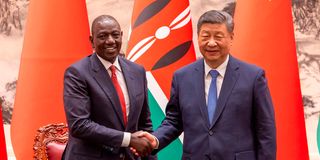Premium
No need to justify Kenya’s foreign policy

President William Ruto with his Chinese counterpart Xi Jinping at the Great Hall of the People in Beijing, China.
What you need to know:
- Kenya should not be compelled to justify relationships that serve its national development agenda.
- To do so would be to submit to a double standard that no sovereign nation should accept.
It is remarkable how often Kenya is expected to explain itself on matters of foreign policy, particularly when it engages with countries that do not fall within the traditional sphere of Western influence. Despite professing a policy of non-alignment since independence, it seems that principle is only deemed acceptable when it conforms to certain global expectations.
The end of the Cold War marked a profound shift in Africa’s place in international affairs. When the Soviet Union collapsed, the ideological competition that had kept Western attention, and funding, flowing to Africa disappeared almost overnight. No longer needing to counterbalance the influence of communism on the continent, the West adopted a markedly different posture: aloof, disinterested, and often prescriptive.
What followed was the rise of the Bretton Woods era in Africa, where engagement came primarily through institutions like the IMF and World Bank. While often couched in the language of reform and development, the assistance came with strict conditions that proved, in many cases, more burdensome than beneficial.
Troubling undertone
It was not until the early 2000s that the global dynamic began to shift again, this time, with the entrance of China. Through initiatives like the Belt and Road Initiative (BRI), China positioned itself not just as a trading partner but as a key player in Africa’s infrastructural revival. With fewer conditions and a focus on tangible development projects, Beijing quickly gained influence across the continent.
That influence, it seems, has unsettled some of Kenya’s traditional partners. Renewed interest from Western capitals has followed, not necessarily out of a rediscovered affection for Africa, but more plausibly out of concern over losing geopolitical ground to China. This resurgence of attention, though welcome in some respects, has come with a troubling undertone: the suggestion that African countries should account for their relationships with China.
The reality is simpler: Africa, and Kenya in particular, has the right to determine its partners based on national interest. China’s engagement has been consistent, pragmatic, and often devoid of the conditionalities that defined earlier Western aid.
Engagement with China
This is not to suggest that China’s involvement is without concern or scrutiny. No partner is perfect, and Kenya must always remain vigilant to ensure that its sovereignty is preserved, and its development sustainable. But the notion that engagement with China undermines Kenya’s credibility or loyalty to other international partners is both patronising and misplaced.
Every major economy in the world, including the United States, maintains deep trade and investment ties with China. That African countries are doing the same should not invite disproportionate concern, let alone condemnation.
Ultimately, Kenya should not be compelled to justify relationships that serve its national development agenda. To do so would be to submit to a double standard that no sovereign nation should accept. The world has changed, and Kenya, like many others, is simply acting accordingly.

